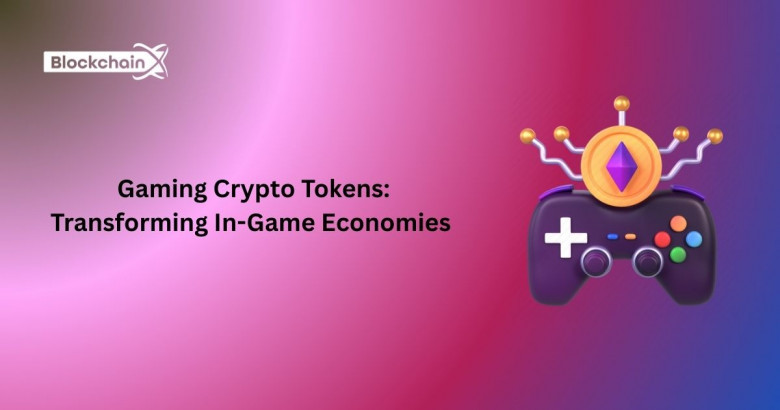views

Introduction
In this content we will discuss the gaming crypto tokens by transforming In game economics. Gaming currencies are having a significant impact on the rapid transition of the digital world. These virtual currencies are used for online games to purchase items, unlock new levels, and trade with other players.
What is Crypto Token?
Crypto tokens are not simply defined as cryptocurrencies since they are more than these digital coins, which serve as the native currency for a particular blockchain platform. Tokens provide a way to carry out a blockchain transaction and act as digital representations of interest in an asset. By the same token, though, tokens can serve a wide range of purposes, from facilitating decentralized transactions to selling rare video game items. This being one of the primary reasons for the proliferation of the many crypto tokens out there. They have become an integral part of the fast-moving evolutionary ecosystem of blockchains, and much, much more.
What are Gaming Tokens?
Digital assets used in gaming or other online gaming venues are referred to as gaming tokens. It uses the blockchain for securing and making transactions transparent. The main function of gaming tokens is as in-game money, which enables users to buy goods, enhance characters, and even receive incentives outside of the game.
Together with the growing digital presence, the significance of virtual belongings is growing. While profiles on social media have turned out to be part and parcel of our identities, so are assets in-game helping pad out our gaming experience. Player attributes, weapons, skins, and other assets often have both emotional significance and financial importance for players.
How does Crypto Tokens Transform In Game Economics?
Crypto tokens altogether change the in-game economies by adding some new ways of valuing, trading, and monetizing virtual assets, which takes the game from entertaining to a player-driven and possibly real-world earning platform. Crypto tokens work on establishing play-to-earn models, allowing tokenized reward systems and incentive programs, and they can also be used as currencies that circulate within the game itself.
-
Play-to-Earn (P2E) Models
-
Tokenized Rewards and Incentives
-
In-Game Currency and Microtransactions
-
Decentralized Ownership and NFTs
Play-to-Earn (P2E) Models
Popular blockchain games that offer prizes for finishing tasks, challenges, or milestones while playing are called "play-to-earn" games. Usually, such rewards take the form of cryptocurrencies or NFTs that can be traded or used in-game to provide players with somewhat tangible value for their work within the game.
Tokenized Rewards and Incentives
Tokenized rewards and incentives use blockchain technology for issuing reward systems in the form of digital tokens, granting much greater flexibility and worldly value than conventional points systems. Tokens can be used in different platforms or even traded or can increase in value, giving them a far greater appeal as a reward.
In-Game Currency and Microtransactions
In-game money is the virtual money within a game, whereas microtransactions are small purchases made using real money for an in-game item or service. Microtransactions are a popular monetization strategy in free-to-play titles where they may confer advantages to the users or can purchase cosmetic items.
Decentralized Ownership and NFTs
NFTs provide distinct, verifiable tokens that signify ownership of digital assets, revolutionizing digital ownership through the use of decentralized technology, particularly blockchain. Unlike traditional systems, wherein ownership records are often managed by centralized authorities, NFTs serve as decentralized alternatives to give more agency to the creators and the users, which would in turn create a more equitable digital economy.
Will Gaming Crypto Tokens Emerge in Future?
Gaming tokens are still in the early stages of development, but still, they have already had quite a lot of influence on the gaming industry. It is anticipated that gaming tokens will continue to grow in value and appeal as a result of various developments in Web3 technology. A gaming token can also be used in making decentralized gaming platforms. The blockchain-based decentralized gaming platforms will make use of the gaming tokens. This will enable players to possess and trade their assets across different games and platforms-creating thereby some sort of additional game interoperability and liquidity.
Conclusion
Finally the crypto tokens in the gaming industry are transformed through In-game economics by different methods in the tokenization platform. Gaming tokens are no longer simple currencies used in games; they have marked their presence on the digital economy landscape. They guarantee safety and ease coupled with fresh financial opportunities, however, when there is good, there are bad sides.






















Comments
0 comment